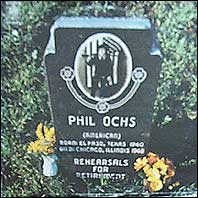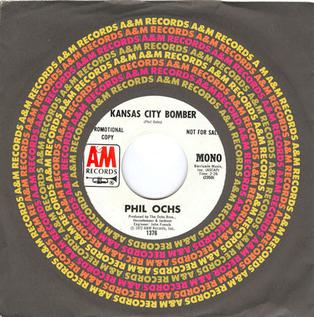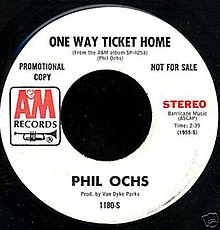
Philip David Ochs was an American protest singer and songwriter who was known for his sharp wit, sardonic humor, political activism, often alliterative lyrics, and distinctive voice. He wrote hundreds of songs in the 1960s and 1970s and released eight albums.

Greatest Hits was Phil Ochs' seventh LP and final studio album. Contrary to its title, it offered ten new tracks of material, mostly produced by Van Dyke Parks, and was released in 1970.

Rehearsals for Retirement is Phil Ochs's sixth album, released in 1969 on A&M Records.
"Power and the Glory" is an American patriotic song by Phil Ochs, a U.S. protest singer from the 1960s known for being a harsh critic of the American military and industrial establishment. Originally released on his 1964 debut album, All the News That's Fit to Sing, "Power and the Glory" is said to have contributed to Ochs' profound impact.
"Outside of a Small Circle of Friends" is a song by Phil Ochs, a U.S. protest singer from the 1960s. "Outside of a Small Circle of Friends", which was originally released on Ochs' 1967 album Pleasures of the Harbor, became one of Ochs' most popular songs.
Jim and Jean, composed of Jim Glover and Jean Ray (1941–2007) were an American folk music duo, who performed and recorded music from the early to the late 1960s.
Jim R. Glover is an American peace activist and folk singer. He is from Cleveland, Ohio and lives in Brandon, Florida.

"I Ain't Marching Any More" is an anti-war song by Phil Ochs, a U.S. protest singer from the 1960s known for being a passionate critic of the American military industrial complex. Originally released on his 1965 album of the same name, "I Ain't Marching Any More" is one of Ochs's best-known songs.
"The War Is Over" is an anti-war song by Phil Ochs, an American protest singer in the 1960s and early 1970s, who is known for being a harsh critic of the war in Vietnam and the American military-industrial establishment. The song, which was originally released on Tape from California (1968), has been described as "one of the most potent antiwar songs of the 1960s".
"There but for Fortune" is a song by American folk musician Phil Ochs. Ochs wrote the song in 1963 and recorded it twice, for New Folks Volume 2 and Phil Ochs in Concert. Joan Baez also recorded "There but for Fortune" in 1964, and her version of the song became a chart hit.

The discography of Phil Ochs, a U.S. protest singer and songwriter, consists of seven studio albums, six live albums, six compilation albums, one box set, six other albums, and nine singles.
"Draft Dodger Rag" is a satirical anti-war song by Phil Ochs, a U.S. protest singer from the 1960s known for being a harsh critic of the American military industrial complex. Originally released on his 1965 album, I Ain't Marching Anymore, "Draft Dodger Rag" quickly became an anthem of the anti-Vietnam War movement.
"Crucifixion" is a 1966 song by Phil Ochs, a US singer-songwriter. Ochs described the song as "the greatest song I've ever written".

"Kansas City Bomber" is a song by Phil Ochs, a US singer-songwriter best known for the protest songs he wrote in the 1960s.
"Cross My Heart" is a 1966 song by Phil Ochs, an American singer-songwriter best known for the protest songs he wrote in the 1960s.

"My Life" is a 1969 song by Phil Ochs, a US singer-songwriter best known for the protest songs he wrote in the 1960s.

Phil Ochs: There but for Fortune is a documentary film on the life and times of folk singer-songwriter Phil Ochs. The film, released theatrically in January 2011, was written and directed by Kenneth Bowser. Its title is taken from one of Ochs' best known songs, "There but for Fortune" (1963).
Sonia "Sonny" Ochs is a music producer and radio host. She is known for the "Phil Ochs Song Nights" she organizes, at which various musicians sing the songs of her brother, singer-songwriter Phil Ochs.
"Love Me, I'm a Liberal" is a satirical song by Phil Ochs, an American singer-songwriter. Originally released on his 1966 live album, Phil Ochs in Concert, "Love Me, I'm a Liberal" was soon one of Ochs's most popular concert staples.








